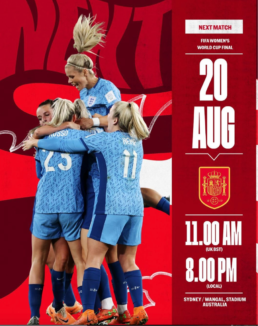Writing this a few hours after the England women’s football team notched up a mighty 3 – 1 win over the Australian Matildas, let’s hope there is more to celebrate ahead.
And I don’t just mean a win in the final – which obviously we all hope for – but that there is now a response to the players’ calls for performance-related pay and we see them receiving parity with their male counterparts.
It’s hard to imagine that women were banned from league football pitches for almost 50 years, and not allowed back into the game until 1970. From there, it was an uphill battle to fund their passion: England did not have a fully professional women’s football league until 2018.
Now, in 2023, these headline-grabbing players are out-performing the men on the European and world stage, generating not just headlines but massive margins for all concerned, except themselves. It’s time this was tackled – and without forcing these star players into the equivalent of a penalty shoot out with the Football Association (FA).

After their last request to the FA on performance-related bonuses was met with a refusal, the players spoke out, highlighting the disparity with not just the men’s game, but also women in other countries. In an open letter, they highlighted the importance of recognition if the women’s game is to grow in future. The issue is shelved while they perform in the World Cup tournament, but should be high on the agenda when they return.
For women footballers, the struggle for recognition started 100 years ago. Then, many women were keen players and by 1921 there were some 150 women’s football clubs, drawing as many as 45,000 fans to watch games.
But that year the Football Association announced a ban on the women’s game being played at the professional grounds and pitches of affiliated clubs, saying: “the game of football is quite unsuitable for females and ought not to be encouraged.”
It took until 1970 for the 1921 resolution to be overturned and women allowed back on the pitch. Let’s hope that now they will get their just rewards.
Certainly, the women coming together from all teams is a great demonstration of the power of teamwork and collective action, and one we can learn from when targeting inequality in other areas of life.
If you’re interested in the history of the women’s game, read more on the FA website and on the British Library archives.
Author

Maggie Taylor
Founder of Lumin, creating opportunities for women solopreneurs to collaborate, grow, and build successful businesses, fuelled by shared knowledge, mentorship, and real partnerships across generations
Related Posts
rethinking success: women, business & purpose
Can women lead the way in redefining business success? Not just as participants…
07/03/2025business,mission,entrepreneurswomen in business,Purpose driven,redefining success,Business for good,RSA,Professor SIr John Kay,Royal Society for the Arts
tackling the march of macho leadership
The march of macho leadership seems unstoppable. How can we foster genuine…
26/02/2025mission,careersleadership,women in leadership,Vladimir Putin,Donald Trump,Elon Musk,Signalling Authenticity,dictatorships
why gender-inclusive product development matters
The way we design our world has long been shaped around a ‘default male’…
20/02/2025ProductDevelopment,WomenInInnovation,WorkplaceEquality,life,mission,WomenInBusinessInclusiveDesign,GenderEquity



